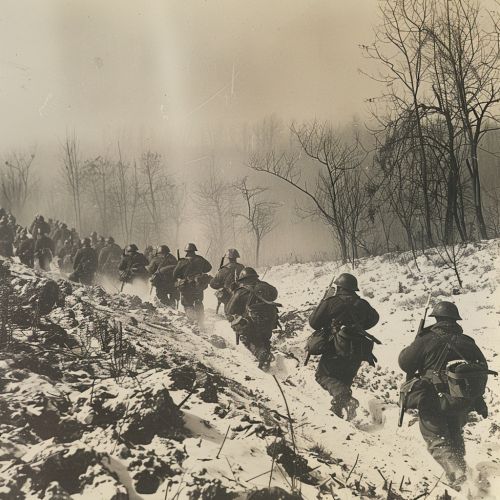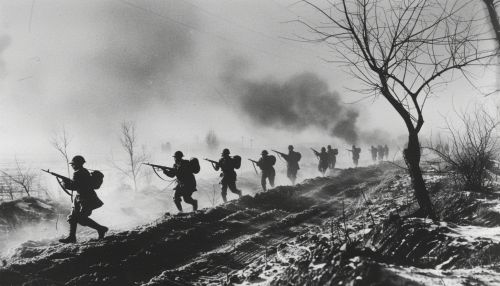Brusilov Offensive: Difference between revisions
No edit summary |
No edit summary |
||
| Line 2: | Line 2: | ||
The [[Brusilov Offensive]], also known as the June Advance, was a major offensive conducted by the [[Russian Empire]] during [[World War I]] in 1916. Named after the commander of the Russian Southwest Front, General [[Aleksei Brusilov]], it was aimed against the forces of the [[Central Powers]] on the Eastern Front. The offensive was notable for its innovative and effective use of shock troops and deep battle tactics, which would later influence military strategy in the 20th century. | The [[Brusilov Offensive]], also known as the June Advance, was a major offensive conducted by the [[Russian Empire]] during [[World War I]] in 1916. Named after the commander of the Russian Southwest Front, General [[Aleksei Brusilov]], it was aimed against the forces of the [[Central Powers]] on the Eastern Front. The offensive was notable for its innovative and effective use of shock troops and deep battle tactics, which would later influence military strategy in the 20th century. | ||
[[Image:Detail-77789.jpg|thumb|center|A black and white photograph of Russian soldiers advancing during the Brusilov Offensive.]] | [[Image:Detail-77789.jpg|thumb|center|A black and white photograph of Russian soldiers advancing during the Brusilov Offensive.|class=only_on_mobile]] | ||
[[Image:Detail-77790.jpg|thumb|center|A black and white photograph of Russian soldiers advancing during the Brusilov Offensive.|class=only_on_desktop]] | |||
== Prelude == | == Prelude == | ||
Latest revision as of 19:46, 7 May 2024
Background
The Brusilov Offensive, also known as the June Advance, was a major offensive conducted by the Russian Empire during World War I in 1916. Named after the commander of the Russian Southwest Front, General Aleksei Brusilov, it was aimed against the forces of the Central Powers on the Eastern Front. The offensive was notable for its innovative and effective use of shock troops and deep battle tactics, which would later influence military strategy in the 20th century.


Prelude
In the spring of 1916, the Russian High Command, known as Stavka, was under pressure to relieve the French forces at Verdun by launching an offensive on the Eastern Front. The initial plan, proposed by General Alexei Evert, was to launch a major offensive in the region of Vilna. However, General Brusilov, who was in command of the Southwest Front, proposed a different strategy. He suggested a broad front offensive against the Austro-Hungarian forces in Galicia, which he believed were weak and could be easily broken through.
Planning and Preparation
Brusilov's plan was innovative in several ways. Instead of concentrating his forces for a breakthrough at a single point, he spread them along a wide front. This was intended to prevent the enemy from predicting the main point of attack and concentrating their reserves there. Furthermore, Brusilov planned to use shock troops, small units of highly trained soldiers, to penetrate the enemy lines and disrupt their defenses. This was a significant departure from the traditional strategy of using mass infantry assaults.
The Offensive
The Brusilov Offensive began on June 4, 1916, with a massive artillery bombardment of the Austro-Hungarian lines. The Russian forces then launched their attack along a 300-kilometer front. The Austro-Hungarian forces were taken by surprise and suffered heavy losses. By the end of June, the Russian forces had advanced up to 60 kilometers and captured over 200,000 prisoners.
Aftermath
The Brusilov Offensive was a major success for the Russian Empire. It inflicted heavy casualties on the Austro-Hungarian forces and forced Germany to divert troops from the Western Front to reinforce their ally. However, the offensive also exhausted Russia's reserves and highlighted the shortcomings of its logistical and supply systems. The offensive was eventually halted in September 1916 due to a combination of logistical problems and the arrival of German reinforcements.
Legacy
The Brusilov Offensive is considered one of the most lethal offensives in world history. It demonstrated the effectiveness of shock troops and deep battle tactics, which would later be adopted by other armies. However, it also highlighted the limitations of Russia's military capabilities and contributed to the unrest that would eventually lead to the Russian Revolution in 1917.
